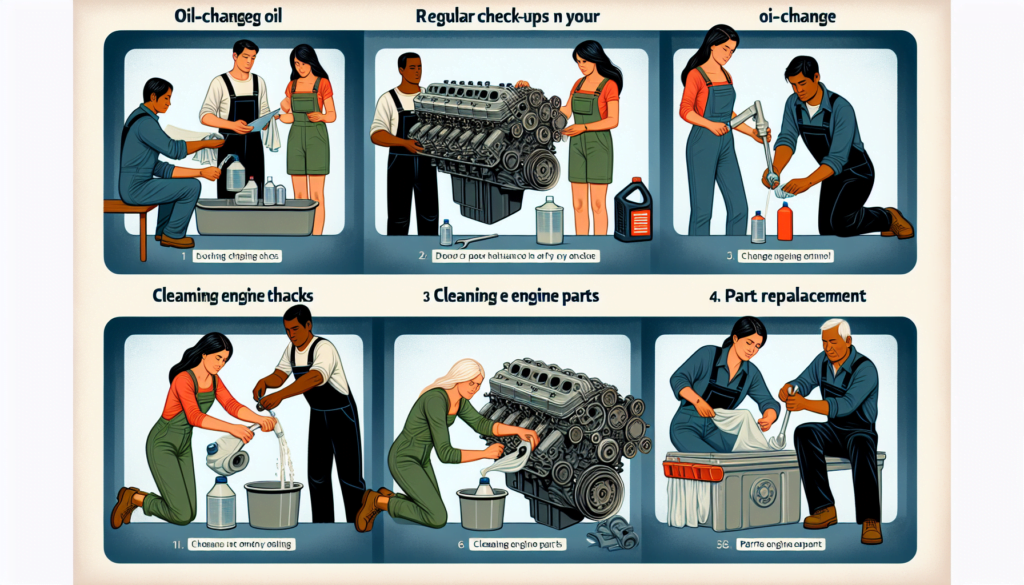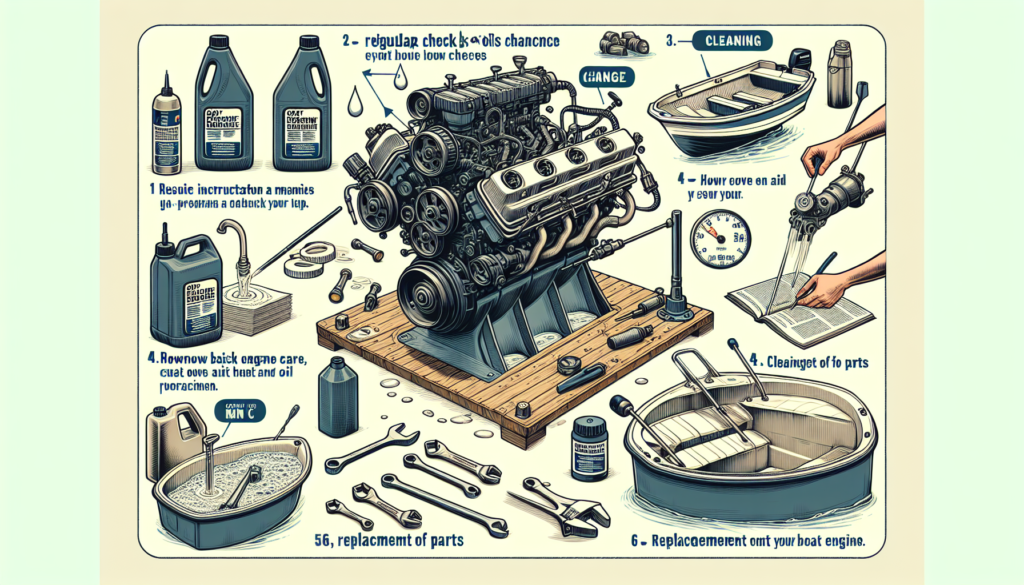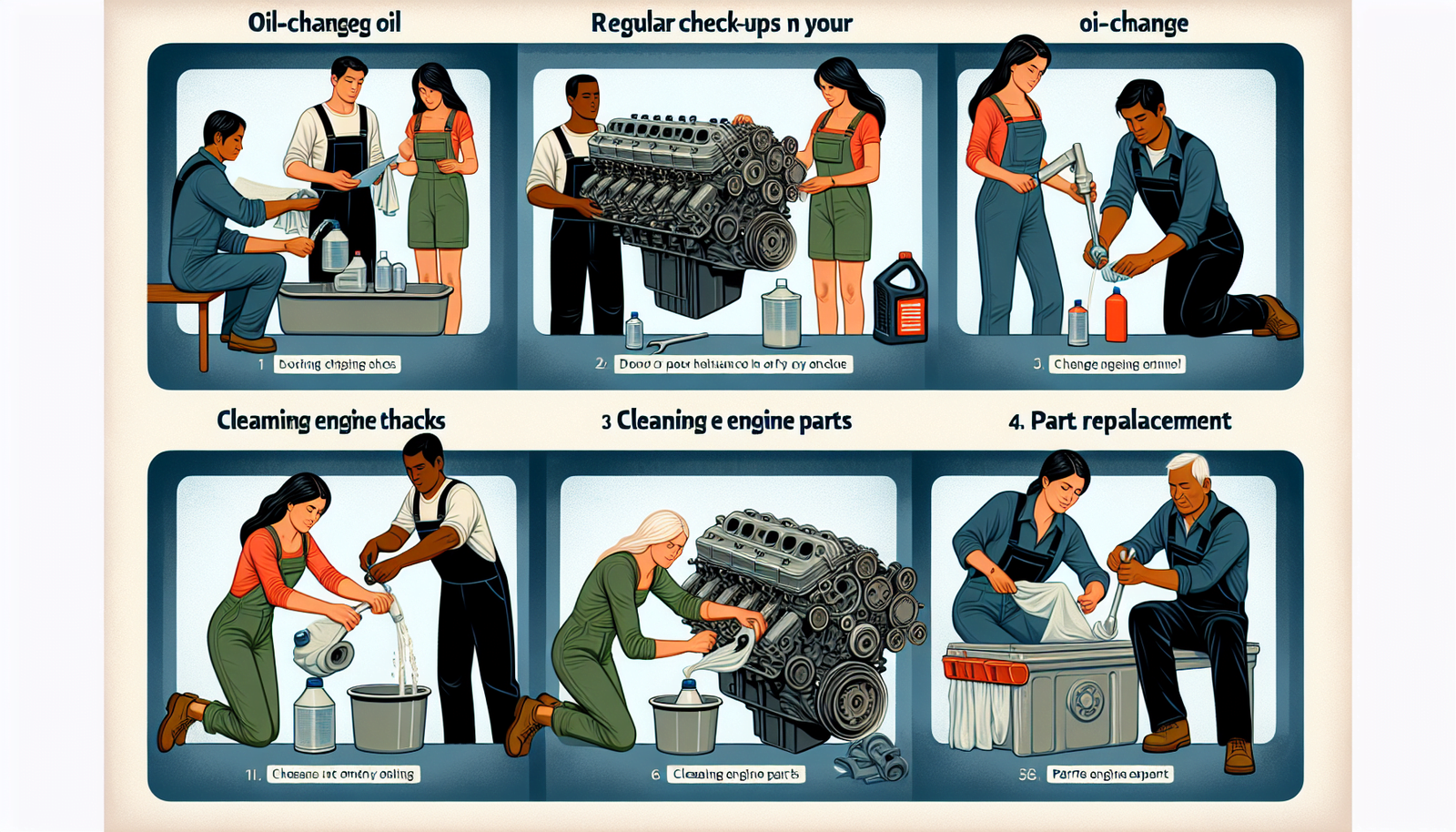There’s nothing quite like the feeling of slicing through ocean waves or calm lake waters in your reliable boat, with the engine purring smoothly beneath you. But to ensure that your aquatic adventures continue without a hitch, consistent boat engine maintenance is crucial. If neglected, even the most robust machines start showing signs of wear and tear. In “Key Maintenance Tasks To Keep Your Boat Engine Running Smoothly,” you’ll learn vital strategies to keep your engine performing at its peak, plus tips on identifying early signs of trouble. You’ll glean insights from experienced professionals, ensuring that your maritime journeys remain enjoyable affairs rather than turning into desperate calls to the coast guard. So, read on and take the helm of engine maintenance to let your boat adventures run as smoothly as your engine should.

Understanding the Importance of Regular Maintenance
To keep your boat engine running smoothly, regular maintenance is quite essential. Just like a car or any other mechanical equipment, your boat engine requires timely checks and tune-ups to ensure it retains its efficiency and longevity.
Breaking down benefits of preventative maintenance
Preventative maintenance allows you to spot potential issues in their budding stages, preventing minor problems from escalating into daunting repairs. It holds the potential to save you a considerable amount of time and money in the long run. Furthermore, preventative maintenance also helps to extend the lifespan of your boat engine, offering you a smoother sailing experience.
Sharing implications of poor maintenance on efficiency and longevity
On the other hand, poor maintenance or a complete lack of it, can lead your boat engine towards a multitude of problems. It can degrade the engine’s efficiency, causing increased fuel consumption and reduced power output. Moreover, it diminishes the overall lifespan of the engine and could lead to frequent, costly maintenance requirements as damage sets in.
Knowing Your Boat Engine
In order to effectively maintain your boat engine, you must have a thorough understanding of it.
Identifying engine types: inboard, outboard, and stern drive
First and foremost, identify the type of engine you have. The main types are the inboard, outboard, and stern drive. Each type requires its own specific maintenance routines and checks.
Matching maintenance tasks to your engine type
Inboard engines, for instance, may require more complex maintenance checks and more frequent oil changes than the other two types. Outboard engines, on the other hand, might require more regular fuel system checks as they are often exposed to the elements. Stern drives do have their unique maintenance needs too, including regular driveshaft maintenance.
Catching common engine problems early
With regular maintenance, you can catch common engine problems early. Regular inspections can help identify problems like water in the fuel, engine overheating, misfires, and other common issues before they turn into major repairs.
Conducting Regular Engine Inspections
Conducting regular engine inspections is a crucial part of preventative maintenance.
Surveying for visible physical damage
Start by looking for visible physical damage. This could include cracks, dents, or any signs of wear and tear on the exterior of the engine.
Checking the hoses and belts condition
Next, check the hoses and belts that are crucial to your engine’s operation. Look for any signs of cracks, splitting, or fraying. If the belts and hoses are dry, it’s a sign that they need to be replaced.
Identifying signs of corrosion and its prevention
Lastly, keep an eye out for signs of corrosion. If there’s any rust or corrosion visible on your engine, it needs to be addressed immediately. Regular cleaning and use of anti-corrosive products can help prevent corrosion.
Optimising Engine Performance through Tune-ups
Engine tune-ups are another pivotal aspect of the maintenance process.
Detailing the benefits of regular tune-ups
Regular tune-ups encompass various engine checks, oil changes, and so on that optimise your engine’s performance and fuel efficiency. They also play a crucial role in keeping your engine reliable.
Discerning the necessary components of a thorough tune-up
A thorough tune-up will comprise of spark plug checks and replacement, fuel system cleaning, oil changes, and lubrication of moving parts, among other tasks.
Explaining timing and scheduling of tune-ups
As a rule of thumb, it’s advisable to have your engine tune-up at least once a year. However, the right timing could vary based on your boat’s model, age, and the frequency of use.

Prioritising Regular Oil Changes
Regular oil changes are instrumental to the well-being of your boat engine.
Understanding the role of oil in engine performance
Oil ensures the smooth running of various components, helps cool the engine by reducing friction, and aids in flushing out contaminants.
Learning about oil types suitable for boat engines
There are a variety of oil types available on the market. However, you should always opt for oil designed for boat engines—commonly monikered as marine oil.
Detailing the proper procedures of changing boat engine oil
The process of changing boat engine oil entails draining the old oil, replacing the oil filter, and refilling with new oil. However, the steps could slightly vary based on engine type and model.
Determining the ideal frequency of oil changes
This could depend on your model, engine type, and how often you use the boat. However, generally, it’s good to change the oil every 50 to 100 hours of engine operation.
Importance of Fresh Fuel
Your engine’s performance and longevity also hinge on the quality of fuel you use.
Storing fuel properly to prevent degradation
Proper storage of fuel is essential to prevent degradation that could affect performance. You should always store fuel in a clean, sealed container, away from direct sunlight.
Using additives to improve fuel quality
Fuel additives can help extend the life of your fuel and improve your engine’s performance. They do so by minimizing carbon build-up and maintaining the cleanliness of fuel injection systems.
Regularly changing fuel filters
Just like oil filters, fuel filters should be regularly changed too. A clogged or dirty filter could affect your engine’s performance and lead to other problems.
How stale fuel can affect your boat engine performance
Stale or degraded fuel can lead to several engine problems, including a loss of power, poor fuel efficiency, and damage to the engine’s internal components.
Maintaining a Clean Cooling System
Your engine’s cooling system plays a vital role in its performance and overall health.
Understanding the role of cooling system in engines
The cooling system prevents your engine from overheating, which can cause serious damage to your engine’s internal components.
Identifying common issues related to cooling system
Some common cooling system issues include a blocked radiator, faulty thermostat, and low coolant levels. Regular maintenance can help identify and rectify these issues early.
Employing best practices for cooling system maintenance
Regularly flushing your cooling system and replacing the coolant can help keep the cooling system in top shape. Always ensure that you use the correct type and mix of coolant as specified by the manufacturer.
Regularly flushing of the cooling system
The coolant should be flushed and changed at least once a year or as per the manufacturer’s instructions.
Consistency in Battery Care
Battery care isn’t something that should be overlooked.
Selecting the right battery for your boat
Ensure you are using the right type of battery for your boat. The two most common types are crank batteries, used for starting your engine, and deep-cycle batteries, used when the engine is off.
Implementing best practices in battery storage
When storing your boat, remember to disconnect the battery and store it in a cool, dry place. This can help extend the battery’s life.
Checking and maintaining battery charge
Regularly check your battery’s charge. A battery monitor can be helpful for this. Avoid letting the battery’s charge drop too low, as it could shorten its lifespan.
Lifetime of a boat battery and when to replace it
Typically, boat batteries last around 3-5 years. However, this could vary depending on usage and maintenance. Replace it if it doesn’t hold a charge or if it’s past its lifespan.
Protecting Your Engine from Corrosion
Marine corrosion can cause a lot of damage if not treated promptly.
Understanding marine corrosion and its effect on boat engines
Marine corrosion typically affects parts of your boat engine that are exposed to seawater. This can lead to rusting and damage to the affected parts, which impair efficient engine operation.
Employing preventative measures against corrosion
Using anti-corrosion sprays, keeping your boat clean, and ensuring the correct grounding system can help prevent corrosion.
Treatments for existing corrosion in the engine
For existing corrosion, clean the affected parts thoroughly and use an anti-corrosion spray. You may need to replace severely affected parts.
Importance of anti-corrosive products
Anti-corrosive products, from sprays to coatings, play an essential role in preventing and treating marine corrosion on your boat engine.
Winterizing Your Boat Engine
Winterizing your boat engine is necessary if you don’t plan to use it for a while, particularly through the cold months.
Defining engine winterization and why it’s necessary
Engine winterization involves the process of preparing your boat engine for inactivity during the winter. This ensures parts won’t freeze or corrode during this period.
Learning the steps to properly winterize your engine
Winterization steps typically involve draining and replacing certain fluids, disconnecting the battery, and thoroughly cleaning your boat. Depending on your boat’s specifics, additional steps might be necessary.
Importance of using antifreeze during winterization
Antifreeze plays a critical role in winterization. It prevents the remaining water in your boat’s system from freezing and causing damage.
Storing the engine properly during winter
Ensure your boat engine is stored in a dry, sheltered place away from the elements. A well-ventilated boat cover can also keep moisture from getting trapped within.
In conclusion, each of these steps plays a critical role in keeping your boat engine running smoothly. So, make sure to stay up-to-date on your boat’s maintenance schedule to ensure a smooth sailing experience.

